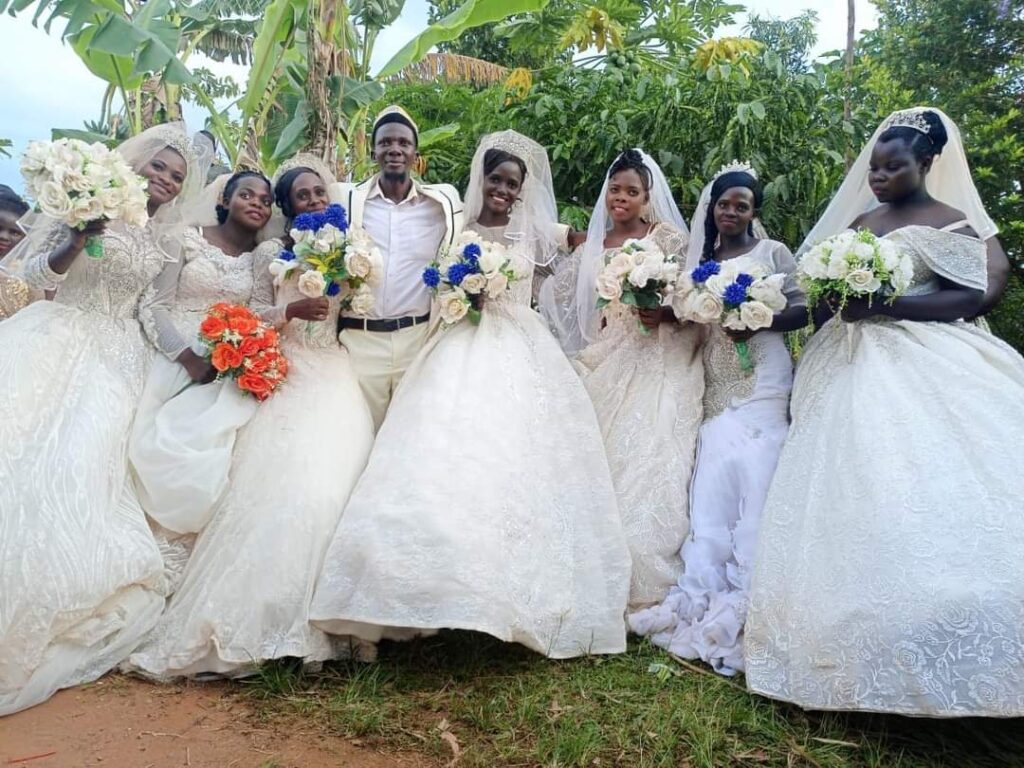Hajj Habib Nsikonnene, a prominent businessman hailing from Kijjo-Namasengere village in Nakifuma Sub County, Mukono district, central Uganda, made headlines in the region for his remarkable and unconventional wedding ceremony that took place on Sunday, September 10th. Born into a family with a longstanding tradition of polygamy, Nsikonnene gained widespread attention when he simultaneously married seven wives in a historic event that captivated the residents of Nakifuma and beyond.
The Historic Wedding
The “historic wedding occasion” began early in the morning at around 8 am when the brides embarked on a journey to local salons for styling. These seven brides, identified by their first names as Rashidah, Aisha, Fatuma, Shanifah, Mariam, Zainah, and another Aisha, were subsequently transported in Super Custom vans, each bearing specialized plates with the names of the respective brides.
The ceremony continued with the exchange of marital vows, where Hajj Nsikonnene officially united with his seven wives. Following the religious rites, the newlyweds, along with their groom, embarked on a grand procession led by bodaboda cyclists. This procession traversed through the towns of Kalagi, Kasana, and Nakifuma, before culminating in their homecoming at 6 pm.
The Groom’s Perspective
Let Us Build Your Online Success!
We are the experts in creating visually stunning and functional websites. With reliable hosting and exceptional customer support, we bring your vision to life. Join hundreds of happy clients who trust us!
Get Started Now📞 Call/WhatsApp: +256 207 800 192
During the wedding reception, Nsikonnene expressed his gratitude to his wives for their unwavering loyalty, with the eldest among them having been in his life for seven years. Hajj Habib Nsikonnene’s commitment to his unconventional choice of marrying seven wives, exceeding the norm set by the Muslim faith of four wives per husband, stems from his enduring relationships with each of his wives, spanning a minimum of four years.
He proudly declared, “My wives harbor no jealousy amongst themselves.” Nsikonnene also hinted at the possibility of expanding his family in the future, stating, “I introduced them separately and decided to wed them all at once to make one big happy family. I am still a young man, and in the near future, God willing, I cannot say this is the end of it.”
A Tradition of Polygamy
Nsikonnene’s father, Hajj Abdul Ssemakula, shed light on the family’s tradition of polygamy. He recounted that his grandfather had six wives who coexisted in a single house, separated by curtains. Hajj Ssemakula himself maintained this tradition, having four wives living together in one house.
The Community’s Reaction
Residents of Nakifuma described the wedding as an event for the history books, with some expressing that witnessing this extraordinary ceremony had completely alleviated any jealousy they may have harbored. One local resident, aged 57, exclaimed, “This is history for us. I have never seen anything like this in my 57 years.” Another resident, a woman, added, “I cannot be jealous anymore; I also want to be married in the same way.”
Hajj Habib Nsikonnene’s wedding not only marked a significant personal milestone but also became a memorable and transformative event for the community of Nakifuma, challenging societal norms and sparking conversations about the institution of marriage and polygamy in Uganda.

